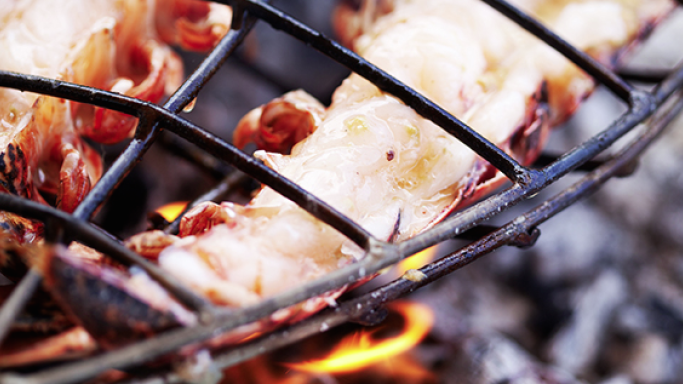This is a version of an article also published by the Financial Times.
There is no better harbinger of culinary pleasures to come than watching a heavily laden fishing boat heading for port. Ideally, this should be somewhere in the Mediterranean with the sea and sky the same deep blue.
Most of these conditions were fulfilled as we drove along the beach at L’Escala, 150 kilometres north of Barcelona on the Costa Brava, except for one. We were lost. The modern buildings around us bore no resemblance to the unspoilt area we had been led to believe surrounds Hostal Empúries, our lunch destination.
We finally found this version of a hip hotel, between pine trees and a small sandy bay, just to the north of the town. It has the further advantage of a particularly tranquil neighbour. The Greeks created an important trading centre here in the 7th century BC and were followed by the Romans. Exceptionally intact ruins of both settlements remain next door to the hotel.
These ruins are also an indication of the unbroken connection between this area and the fishing industry. What remains of one of the Greek buildings we visited after lunch had been used for the preparation of a fish sauce, presumably a precursor of garum, the fish sauce that was subsequently to become an integral part of Roman cooking. Before wandering around the ancient white stones under a scorching sun, I was to experience two aspects of the local fishing business today, one thriving, one not.
The hotel’s restaurant overlooking the crescent beach occupies the area between the older part of the hotel complete with Greek columns and its more modern bedroom block. The designers obviously had a lot of fun joining the two together.

The light reflected off the sea is incredibly strong, accentuated by the white linen tablecloths and the intentionally distressed paint on the woodwork. The entire room has a most relaxed marine feel, similar to that of a dining room in a whitewashed hotel in Maine or New England. The biggest difference is that there are far more people swimming in the relatively warm Mediterranean than in the chillier Atlantic.There was ample time to enjoy this view before I was to join Rafa Peña, the young bearded chef, on his visit to the local 3 pm fish auction. His lunch menu was brief but manages to highlight precisely why he enjoys cooking here two days a week as consultant chef alongside head chef Biel Gavalda, while the rest of the time he devotes to his own restaurant, Gresca, (Catalan for a party) in Barcelona.
The first course, after toasts with appetising anchovy butter, was teriyaki mackerel, the fish served in six thick cylinders upturned on the plate with two sauces, one based on soy and sesame, the other a tarragon mustard vinaigrette. The inspiration for our two main courses was much more local: thick, succulent pieces of octopus alongside potatoes cooked with olive oil and diced red peppers and a paella dish of black rice, due to a profusion of diced squid, and several sweet langoustines deftly sliced down the middle. The wine list is a roll call of Europe’s better-known natural winemakers.
At 2.40 pm I met Peña, sporting a white chef’s jacket and shorts, in the car park and we set off at high speed. En route he explained that there are two fish auctions a day here, one in the morning for what are referred to locally as ‘blue fish’, sardines and anchovies, and the one in the afternoon for the larger fish. But the morning auction is today far less interesting, he added sadly. ‘L’Escala was once very well known for its anchovies but there are simply none left.’ Certainly the sardines I was served at lunch in Roses across the bay two days later were so small and skinny that they gave little pleasure.
But this auction was highly enjoyable as much because of the fishermen as because of the fish. Short, stocky, tanned and garrulous, they were delighted to see Peña and Gavalda, with whom they speak regularly by phone from their boats. One in particular was keen that Peña listen to every detail of his recipe for the best cod stock.
On the admirably clean floor of a large hangar by the quay were about 45 yellow boxes containing that day’s catch. One, of plump red mullet, caught from around the rocks so that they were the very best in Peña’s opinion, were the first of the season, as were five spiny rock lobsters. There was hake, including one strange albino that nobody had ever seen before; line-caught squid, still alive, that changed colour as those who were interested in buying it ran their fingers over it; monkfish; octopus; and sole.
The men, and one female restaurateur from Girona, fell silent as a woman’s voice came over the tannoy, part of the programme that controls the auction (the fishermen prefer a woman’s voice) at 3 pm calling out the opening prices. Twenty minutes later it was all over. Peña and Galvada walked off with five boxes, including the red mullet, to their small white van.
I asked Peña when he felt would the best time to return. ‘As a customer, I would say September or October, although it can be lovely here even in January. But as a chef I love it here over the summer as the place is very busy and we can be cooking up to 50 kg of fish. ‘Over the weekend?’, I asked. ‘No’, he replied enthusiastically, ‘that can be just a Saturday or Sunday lunchtime.’
Hostal Empúries Platja de Portitxol, 17130 L'Escala, Girona, Spain: tel +34 972 77 02 07
The photos are taken from the Hostal's website.

